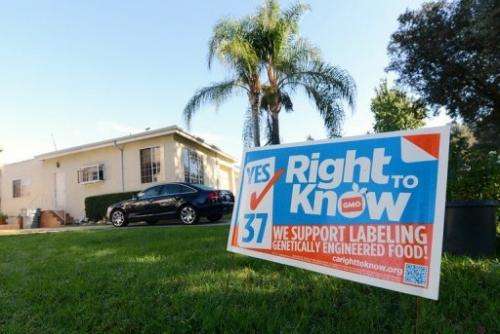A sign supporting Proposition 37 which calls for the mandatory labeling of genetically engineered foods is seen in front of a home in Glendale, California on October 19. California could become the first US state to enforce labeling of GMO's, in a vote next month pitting agro-chemical manufacturing giants against die-hard opponents of so-called "frankenfoods."
California could become the first US state to enforce labeling of genetically modified (GM) foods, in a vote next month pitting agro-chemical giants against opponents of so-called "Frankenfoods."
The western state will vote on November 6—the day of the White House election—on Proposition 37, which backers claim would simply let consumers know what they are eating, but critics say will pander to unjustified fears.
Like many states, California is holding a series of "ballot initiatives" on the same day as the presidential vote, but the so-called "Prop 37" fight has emerged as the most divisive.
"People in the US have been trying for over a decade to get labeling of genetically engineered food, just like Europe has done," said spokeswoman Stacy Malkan of the Yes to Prop 37 campaign.
"Now, 61 countries have labeling laws for GMOs... much of the genetic engineering is happening in the US, we're the experimental ground for GMOs. And the experiment is not going well," she added.
Californian organic rice grower Jessica Lundberg, head of Lundberg Family Farms, backs Prop 37—and says she hopes it will spur similar moves in other US states, if it passes.
"The national implications are really exciting, because California can be a leader. California, through this initiative, which is so well written and can so easily be implemented, can be a model for many, many other states," she said.
The prospect is not to the taste of agro-chemical and agro-food giants like Monsanto, Bayer, BASF, DuPont, Coca Cola, Pepsi, Kellogg and Heinz, who have spent millions of dollars on advertising to defeat the ballot initiative.
According to official figures, backers of the proposal had raised a little more than $4 million by the end of September, compared to $34 million for those against it, who have financed a massive publicity campaign.
The effects were immediate: at the end of September, a poll showed the Yes camp with 66.9 percent, with only 22.3 percent voting against. But by mid-October, that had changed radically, with 48.3 percent in favor and 40.2 percent against, according to the Pepperdine University survey.
Opponents of GM crops, some of whom in Europe label them "Frankenfoods" after Gothic novelist Mary Shelley's bolted-together monster, claim that not enough is known about the potential dangers.
Monsanto—the biggest contributor to the campaign against Prop 37 in California, having given $7.1 million—claims that the move is aimed at "stigmatizing modern food production.
"While we respect that some people may choose to avoid GM ingredients, it is wrong to mislead and scare people about the safety of their food choices," added the maker of the pesticide Roundup and transgenic soya and corn seeds.
Critics of the ballot initiative also highlight the fact that numerous foodstuffs would be excluded from the need for GM labeling, notably meat—even from animals fed with GM foodstuffs—as well as dairy products and alcohol.
"This is being promoted as a measure to give consumers information when they're eating (GM) ingredients. But it gives special exemptions to two-thirds of the food that we eat every day," said Kathy Fairbanks of No on Prop 37.
The campaign spokeswoman claimed that Prop 37 would increase grocery bills for California families by up to $400 a year, adding: "It also will cost state taxpayers more than a million dollars a year to keep track of paperwork."
Lawyers could also abuse it to make money on lawsuits. "It invites predatory extortion-type shakedown lawsuits. That can wipe out a grocery store or a small market. The only beneficiaries of Prop 37 are the lawyers," she said.
Defenders of Prop 37 cite the right to freedom of information. "The bottom line is that Prop 37 is not a ban, it's just a label. We have the right to know what's in our food too," said Malkan.
The American Medical Association (AMA) has also weighed in on the debate, which is being watched closely by other US states.
The AMA "believes that .. there is no scientific justification for special labeling of bioengineered foods, as a class, and that voluntary labeling is without value unless it is accompanied by focused consumer education," it said.
The association added that it "recognizes the many potential benefits of bioengineered crops and foods, does not support a moratorium on planting (GM) crops, and encourages ongoing research developments in food biotechnology."
But it also urged the US Food and Drug Administration (FDA) "to remain alert to new data on the health consequences of bioengineered foods, and update its regulatory policies accordingly."
(c) 2012 AFP






















